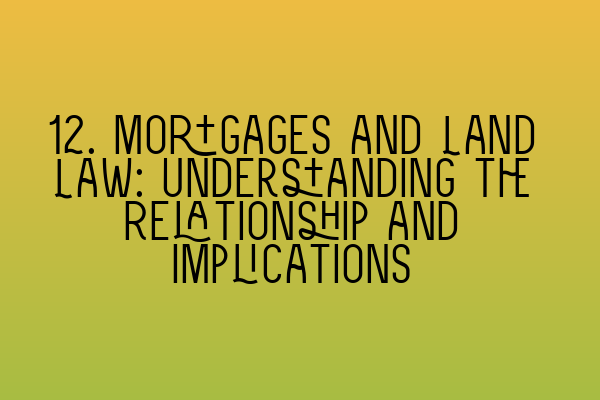12. Mortgages and Land Law: Understanding the Relationship and Implications
When it comes to property law, understanding the relationship between mortgages and land law is crucial. Mortgages play a significant role in property transactions and have important implications for both buyers and lenders. In this article, we will explore the fundamentals of mortgages in land law, their impact on property ownership, and key considerations for buyers, lenders, and solicitors.
1. What is a Mortgage?
A mortgage is a legal agreement between a borrower (mortgagor) and a lender (mortgagee) that allows the borrower to secure a loan using real property as collateral. The lender provides the loan amount, and the borrower uses their property as security for repayment. This security interest is established through a mortgage deed, which is registered against the property at the Land Registry.
Acquiring a mortgage allows individuals and businesses to access funds to purchase property, invest in real estate, or undertake development projects. However, it’s important to remember that failing to make mortgage repayments can result in the lender seeking repossession of the property.
2. Mortgages and Property Ownership
Understanding how mortgages affect property ownership is crucial for buyers. When a property is purchased with a mortgage, the buyer becomes the legal owner of the property, but the mortgagee retains a legal interest in the property until the loan is fully repaid. This means that the mortgagee has the right to repossess and sell the property if the borrower defaults on their repayments.
It’s important for buyers to carefully consider their mortgage options and ensure they can comfortably meet the repayment obligations. Failing to do so could result in losing ownership of the property and adversely affecting their financial stability.
3. Types of Mortgages
There are different types of mortgages available in the market, each with its own terms, conditions, and implications. Some common types of mortgages include:
- Fixed-Rate Mortgages
- Variable-Rate Mortgages
- Interest-Only Mortgages
- Repayment Mortgages
- Joint Mortgages
Understanding the different types of mortgages and their implications is essential for buyers. It’s advisable to seek professional advice from a qualified solicitor to determine the most suitable mortgage option based on individual circumstances and financial goals.
4. Responsibilities of Buyers and Lenders
Both buyers and lenders have specific responsibilities in a mortgage transaction:
- Buyer’s Responsibilities:
- Repaying the loan amount as per the agreed terms and conditions
- Maintaining and insuring the property throughout the mortgage term
- Informing the lender about any changes or potential issues related to the property
- Complying with all legal and contractual obligations
- Lender’s Responsibilities:
- Providing accurate information and advice to the borrower
- Ensuring the mortgage is registered against the property
- Monitoring the borrower’s repayment performance
- Enforcing the mortgage terms and conditions in case of default
Understanding these responsibilities is crucial for both parties to avoid any disputes or legal issues in the future.
5. Role of Solicitors in Mortgage Transactions
Solicitors play a vital role in mortgage transactions. They assist both buyers and lenders in ensuring a smooth and legally compliant transaction. Some key ways in which solicitors help in mortgage transactions include:
- Conducting property searches and due diligence to identify any potential issues
- Negotiating and drafting relevant legal documents, including the mortgage deed
- Ensuring compliance with all legal and regulatory requirements
- Providing independent legal advice to the buyer and lender
- Registering the mortgage at the Land Registry
- Facilitating communication and coordination between all parties involved
Working with a knowledgeable and experienced property solicitor is crucial for a successful mortgage transaction.
If you require assistance with mortgage-related legal matters in the SQE exam or in practice, feel free to contact SQE Property Law & Land Law, the leading property law firm with a team of experienced solicitors.
For SQE 1 preparation, we offer a range of useful resources, including SQE 1 Practice Exam Questions and SQE 1 Practice Mocks FLK1 FLK2. For those preparing for SQE 2, we provide comprehensive SQE 2 Preparation Courses. Additionally, you can check out our SQE 1 Preparation Courses for a comprehensive review of the syllabus.
Stay updated with the latest SRA SQE exam dates by visiting our website: SRA SQE Exam Dates.
In conclusion, understanding the relationship between mortgages and land law is essential for property buyers, lenders, and solicitors. By considering the implications of mortgages, selecting the most suitable mortgage option, and working with experienced solicitors, individuals can pave the way for successful property transactions.
